- Home
- Robert Harris
Conclave Page 4
Conclave Read online
Page 4
He checked the closet and saw with satisfaction that his efficient chaplain, Father Zanetti, had already brought over his suitcase from his apartment and had even unpacked it for him. His choir dress was hanging up. His red biretta was on the top shelf, his underwear in the drawers. He counted up the number of socks and smiled. Enough for a week. Zanetti was a pessimist. In the tiny bathroom his toothbrush, razor and shaving brush had been laid out, along with a packet of sleeping pills. On the desk were his breviary and Bible, a bound copy of Universi Dominici Gregis, the rules for electing a new Pope, and a much thicker file, prepared by O’Malley, containing the details of every cardinal who was eligible to vote, along with their photograph. Beside it was a leather folder in which was the draft of the homily he would have to deliver the next day when he celebrated the televised Mass in St Peter’s Basilica. The mere sight of it was enough to give him stomach cramps, and he had to move quickly to the bathroom. Afterwards he sat on the edge of the bed with his head bowed.
He tried to tell himself that his feelings of inadequacy were simply proof of a proper humility. He was the Cardinal-Bishop of Ostia. Before that he had been the Cardinal-Priest of San Marcello al Corso in Rome. Before that, the titular Archbishop of Aquileia. In all of these positions, however nominal, he had played an active part: had preached sermons and celebrated Mass and heard confessions. But one could be the grandest prince of the Universal Church and still lack the most basic skills of the commonest country priest. If only he had experienced life in an ordinary parish, just for a year or two! Instead, ever since his ordination, his path of service – first as a professor of canon law, then as a diplomat, and finally, briefly, as Secretary of State – had seemed only to lead him away from God rather than towards Him. The higher he had climbed, the further heaven had receded. And now it fell to him, of all unworthy creatures, to guide his fellow cardinals in choosing the man who should hold the Keys of St Peter.
Servus fidelis. A faithful servant. It was on his coat of arms. A prosaic motto for a prosaic man.
A manager . . .
After a while he went into the bathroom and poured himself a glass of water.
Very well then, he thought. Manage.
*
The doors of the Casa Santa Marta were scheduled to close at six. No one would be admitted after that. ‘Come early, Your Eminences,’ Lomeli had advised the cardinals at their last congregation, ‘and please remember that no communications with the outside world will be permitted after you’ve checked in. All mobile telephones and computers must be surrendered at the front desk. You will have to pass through a scanner to make sure you have not been forgetful. It would speed up registration considerably if you simply left them behind.’
At five to three, wearing a winter coat over his black cassock, he stood outside the entrance, flanked by his officials. Once again, Monsignor O’Malley, the Secretary of the College, and Archbishop Mandorff, the Master of Papal Liturgical Celebrations, were with him, along with Mandorff’s four assistants: two masters of ceremonies, one a monsignor and the other a priest, and two friars of the Order of St Augustine who were attached to the Papal Sacristy. He was also permitted the services of his chaplain, young Father Zanetti. These, and two doctors, on standby in case of medical emergencies, were the sum total of those who would supervise the election of the most powerful spiritual figure on earth.
It was getting cold. Invisible but close in the darkening November sky a helicopter hovered a couple of hundred metres above the ground. The drone of its rotors seemed to come in waves, rising and falling as either it or the wind changed direction. Lomeli scanned the clouds, trying to work out where it was. No doubt it would belong to some television network, dispatched to take aerial pictures of the cardinals arriving at the exterior gates; either that, or it was part of the security forces. He had been briefed about security by the Italian Minister of the Interior, a fresh-faced economist from a well-known Catholic family, who had never worked outside politics and whose hands had shaken as he read through his notes. The threat of terrorism was considered serious and imminent, the Minister had said. Surface-to-air missiles and snipers would be stationed on the roofs of the buildings surrounding the Vatican. Five thousand uniformed police and army personnel would openly patrol the neighbouring streets in a show of strength, while hundreds of plain-clothes officers mingled with the crowds. At the end of the meeting the Minister had asked Lomeli to bless him.
Occasionally above the noise of the helicopter floated the distant sounds of protest: thousands of voices chanting in unison, punctuated by klaxons and drumbeats and whistles. Lomeli tried to distinguish what it was they were complaining about. It was impossible. Supporters of gay marriage and opponents of civil union, pro-divorce advocates and Families for Catholic Unity, women demanding to be ordained as priests and women demanding abortions and contraception, Muslims and anti-Muslims, immigrants and anti-immigrants . . . they merged into a single undifferentiated cacophony of rage. Police sirens cried out somewhere, first one and then another and then a third, as if they were courting one another from opposite ends of the city.
We are an Ark, he thought, surrounded by a rising flood of discord.
Across the piazza, in the nearest corner of the basilica, the melodious clock chimed the four quarter-hours in quick succession; then the great bell of St Peter’s tolled three. The anxious security men in their short black coats strutted and turned and fretted like crows.
A few minutes later, the first of the cardinals appeared. They were wearing their everyday long black cassocks with red piping, with wide red silk sashes tied at their waists and red skullcaps on their heads. They climbed the slope from the direction of the Palace of the Holy Office. A member of the Swiss Guard in his plumed helmet walked with them, carrying a halberd. It might have been a scene from the sixteenth century, except for the noise of their wheeled suitcases, clattering over the cobbles.
The prelates came closer. Lomeli squared his shoulders. He recognised two from his briefing book. On the left was the Brazilian Cardinal Sá, Archbishop of São Salvador de Bahia (aged 60, liberation theologian, a possible Pope, but not this time), and on the right, the elderly Chilean, Cardinal Contreras, Archbishop Emeritus of Santiago (aged 77, arch-conservative, one-time confessor of General Augusto Pinochet). Between them walked a small, dignified figure it took him longer to place: Cardinal Hierra, the Archbishop of Mexico City, of whom Lomeli remembered nothing except his name. He guessed at once that they had been lunching together, doubtless trying to agree on a common candidate. There were nineteen Latin American cardinal-electors, and if they were to vote in a block they would be formidable. But one had only to observe the body language of the Brazilian and the Chilean, the way they refused even to look at one another, to realise that such a common front was impossible. They’d probably struggled even to agree on which restaurant to meet in.
‘My brothers,’ he said, opening his arms, ‘welcome.’ Immediately, the Mexican archbishop began complaining in a mixture of Spanish and Italian about his journey across Rome – he showed his arm: the dark fabric was covered in spit – and about their treatment at the entrance to the Vatican, which had scarcely been better. They had been obliged to present their passports, submit to a body search, open their luggage for inspection: ‘Are we common criminals, Dean, or what is this?’
Lomeli took the archbishop’s gesticulating hand in both of his and clasped it. ‘Your Eminence, I hope at least you have had a good lunch – it may be your last for some time – and I am sorry if you felt your treatment was demeaning. But we must do our best to keep this Conclave safe, and I fear a certain inconvenience is the price we shall all have to pay. Father Zanetti will show you to reception.’
And with that, and without letting go of his hand, he gently steered Hierra towards the entrance of the Casa Santa Marta, then released him. Watching them walk away, O’Malley marked their names on his list, then turned to Lomeli and raised his eyebrows, at which Lomeli returned him
a look of such reproof that the monsignor’s capillaried cheeks turned even redder. He liked the Irishman’s sense of humour. But he would not have his cardinals mocked.
In the meantime, another trio had started making its way up the hill. Americans, thought Lomeli, they always stick together: they had even given daily press conferences together until he put a stop to it. He guessed they would have shared a taxi over from the American clergy house, the Villa Stritch. He recognised the Archbishop of Boston, Willard Fitzgerald (aged 68, preoccupied with pastoral duties, still clearing up the mess of the abuse scandal, good with the media); Mario Santos SJ, Archbishop of Galveston-Houston (aged 70, president of the United States Conference of Catholic Bishops, cautious reformer), and Paul Krasinski (aged 79, Archbishop Emeritus of Chicago, Prefect Emeritus of the Apostolic Signatura, traditionalist, strong supporter of the Legionaries of Christ). Like the Latin Americans, the North Americans wielded nineteen votes, and it was widely assumed that Tremblay, as Archbishop Emeritus of Quebec, would pick up most of them. But he wouldn’t get Krasinski’s vote – the Chicagoan had already endorsed Tedesco, and in language calculatedly insulting to the dead Pope: ‘We need a Holy Father who can restore the Church to her proper path after a long period when she has been lost.’ He walked with the aid of two sticks and waved one of them at Lomeli. The Swiss Guard carried his big leather suitcase.
‘Good afternoon, Dean.’ He was gleeful to be back in Rome. ‘I bet you never expected to see me again!’
He was the oldest member of the Conclave: another month and he would have reached eighty, the statutory age limit for voting. He also had Parkinson’s disease, and there had been doubt until the very last minute whether he would be pronounced fit enough to travel. Well, thought Lomeli grimly, he had made it, and there was nothing that could be done about it.
‘On the contrary, Your Eminence, we wouldn’t have dared hold a Conclave without you.’
Krasinski squinted at the Casa Santa Marta. ‘So then! Where have you put me?’
‘I’ve arranged for you to have a suite on the ground floor.’
‘A suite! That’s decent of you, Dean. I thought the rooms were distributed by lot?’
Lomeli leaned in. ‘I fixed the ballot,’ he whispered.
‘Ha!’ Krasinski struck one of his sticks against the cobbles. ‘I wouldn’t put it past you Italians to fix the others too!’
He hobbled away. His companions hung back, embarrassed, as if they had been obliged to bring to a family wedding an elderly relative for whose behaviour they could not vouch. Santos shrugged. ‘Same old Paul, I’m afraid.’
‘Oh, I don’t mind him. We’ve been teasing one another for years.’
And in an odd way Lomeli did feel almost nostalgic for the old brute. They were survivors together. This would be their third papal election. Only a handful of others could say the same. Most of those arriving had never participated in a Conclave before; and if the College chose a young enough man, most would never take part in one again. It was history they were making, and as the afternoon went on and they came up the slope with their suitcases, sometimes singly but mostly in groups of three or four, Lomeli was moved by how many of them were awed by the occasion, even those who tried to put on a show of nonchalance.
What an extraordinary variety of races they represented – what a testament to the breadth of the Universal Church that men born so different should be bound together by their faith in God! From the Eastern ministries, Maronite and Coptic, came the patriarchs of Lebanon, Antioch and Alexandria; from India, the major archbishops of Trivandrum and Ernakulam-Angamaly, and also the Archbishop of Ranchi, Saverio Xalxo, whose name Lomeli took pleasure in pronouncing correctly: ‘Cardinal Khal-koh, welcome to the Conclave . . .’
From the Far East came no fewer than thirteen Asian archbishops – Jakarta and Cebu, Bangkok and Manila, Seoul and Tokyo, Ho Chi Minh City and Hong Kong . . . And from Africa another thirteen – Maputo, Kampala, Dar-es-Salaam, Khartoum, Addis Ababa . . . Lomeli was sure that the Africans would vote as a solid block for Cardinal Adeyemi. Halfway through the afternoon, he noticed the Nigerian strolling across the piazza in the direction of the Palace of the Holy Office. He returned a few minutes later with a group of African cardinals. Presumably he had met them at the gate. As they walked, he pointed out this building and that, in the manner of a proprietor. He brought them over to Lomeli for their official welcome, and Lomeli was struck by how much they deferred to Adeyemi, even the elderly grey-headed eminences like Zucula of Mozambique and the Kenyan, Mwangale, who had been around a lot longer.
But to win, Adeyemni would need to pick up support from beyond Africa and the Third World, and that would be his difficulty. He might win votes in Africa by attacking, as he often did, ‘the Satan of global capitalism’ and ‘the abomination of homosexuality’, but he would lose them in America and Europe. And it was still the cardinals of Europe – fifty-six in all – who dominated the Conclave. These were the men Lomeli knew best. Some, like Ugo De Luca, the Archbishop of Genoa, with whom he had studied at the diocesan seminary, had been his friends for half a century. Others he had been meeting at conferences for more than thirty years.
Arm in arm up the hill came the two great liberal theologians of Western Europe, once outcasts but lately awarded their red hats in a show of defiance by the Holy Father: the Belgian, Cardinal Vandroogenbroek (aged 68, ex-Professor of Theology at Louvain University, advocate of Curial appointments for women, no-hoper), and the German, Cardinal Löwenstein (aged 77, Archbishop Emeritus of Rottenburg-Stuttgart, investigated for heresy by the Congregation for the Doctrine of the Faith, 1997). The Patriarch of Lisbon, Rui Brandão D’Cruz, arrived smoking a cigar, and lingered on the doorstep of the Casa Santa Marta, reluctant to put it out. The Archbishop of Prague, Jan Jandaček, made his way across the piazza still limping as a result of his torture at the hands of the Czech secret police when he was working underground as a young priest in the 1960s. There was the Archbishop Emeritus of Palermo, Calogero Scozzazi, investigated three times for money-laundering but never prosecuted, and the Archbishop of Riga, Gatis Brotzkus, whose family had converted to Catholicism after the war and whose Jewish mother had been murdered by the Nazis. There was the Frenchman, Jean-Baptiste Courtemarche, Archbishop of Bordeaux, once excommunicated as a follower of the heretic Marcel-François Lefebvre, and who had been secretly taped claiming that the Holocaust had never occurred. There was the Spanish Archbishop of Toledo, Modesto Villanueva – at fifty-four the youngest member of the Conclave – an organiser of Catholic Youth, who maintained that the way to God was through the beauty of culture . . .
And finally – and broadly speaking it was finally – there came that separate and most rarefied species of cardinal, the two dozen members of the Curia, who lived permanently in Rome and who ran the big departments of the Church. They formed in effect their own chapter inside the College, the Order of Cardinal-Deacons. Many, like Lomeli, had grace-and-favour apartments within the walls of the Vatican. Most were Italian. For them it was an easy matter to stroll across the Piazza Santa Marta carrying their suitcases. As a result, they had lingered over their lunches and were among the last to arrive. And although Lomeli greeted them just as warmly as he did the others – they were his neighbours, after all – he couldn’t help noticing that they lacked the precious gift of awe he had detected in those who had travelled from across the world. Good men though they were, they were somehow knowing; they were blasé. Lomeli had recognised this spiritual disfigurement in himself. He had prayed for the strength to fight it. The late Pope used to rail against it to their faces: ‘Be on your guard, my brothers, against developing the vices of all courtiers down the ages – the sins of vanity and intrigue and of malice and gossip.’ When Bellini had confided on the day of the Holy Father’s death that the Pope had lost his faith in the Church – a revelation so shocking to Lomeli that he had tried ever since to banish it from his mind – it was surely these bureaucrats he had meant.
Yet it was the Pope who had appointed them all. Nobody had made him pick them. For example, there was the Prefect of the Congregation for the Doctrine of the Faith, Cardinal Simo Guttuso. The liberals had had such high hopes for the genial Archbishop of Florence. ‘A second Pope John XXIII,’ they had called him. But far from granting more autonomy to the bishops, which he had proclaimed as his great cause before he entered the Curia, once installed Guttuso had slowly revealed himself to be every bit as authoritarian as his predecessors, merely lazier. He had become very stout, like a figure from the Renaissance, and walked with difficulty the short distance from his huge apartment in the Palazzo San Carlo to the Casa Santa Marta, which was almost next door. His personal chaplain struggled behind him with his three suitcases.
Lomeli, eyeing the suitcases, said, ‘My dear Simo, are you trying to smuggle in your personal chef?’
‘Well, Dean, one never knows quite when one will be able to go home, does one?’ Guttuso grasped Lomeli’s hand in his two fat damp paws and added hoarsely, ‘Or even, for that matter, if one will be going home.’ The phrase hung in the air for several seconds, and Lomeli thought: dear God, he actually believes he might be elected; but then Guttuso winked. ‘Ah, Lomeli! Your face! Don’t worry, I’m joking. I am one man who is aware of his limitations. Unlike certain of our colleagues . . .’ He kissed Lomeli on either cheek and waddled past him. Lomeli watched him pause in the doorway to recover his breath and then disappear into the Casa Santa Marta.
He guessed it had been lucky for Guttuso that the Holy Father had died when he did. Another few months and Lomeli was sure he would have been asked to resign. ‘I want a Church that is poor,’ the Pope had complained more than once in Lomeli’s hearing. ‘I want a Church that is closer to the people. Guttuso has a good soul but he has forgotten where he came from.’ He had quoted Matthew: ‘If you would be perfect, go, sell what you possess and give to the poor, and you will have treasure in heaven; and come, follow me.’ Lomeli reckoned the Holy Father had had it in mind to remove almost half the senior men he had appointed. Bill Rudgard, for example, who arrived soon after Guttuso: he might come from New York and look like a Wall Street banker, but he had failed entirely to gain control over the financial management of his department, the Congregation for the Causes of Saints (‘Between you, me and the bedpost, I should never have given the job to an American. They are so innocent: they have no idea how bribery works. Did you know that the going rate for a beatification is said to be three quarters of a million euros? The only miracle is that anyone pays it . . .’).

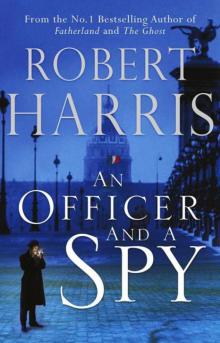 An Officer and a Spy
An Officer and a Spy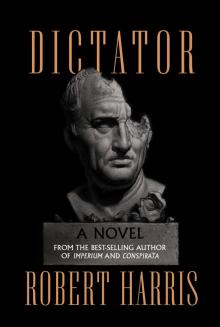 Dictator
Dictator Imperium:
Imperium: Enigma
Enigma Fatherland
Fatherland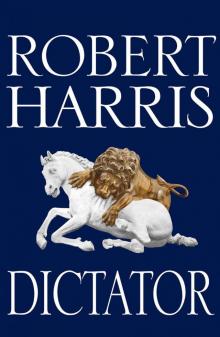 Dictator:
Dictator: Lustrum
Lustrum Archangel
Archangel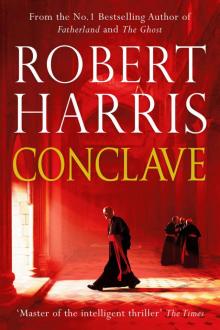 Conclave
Conclave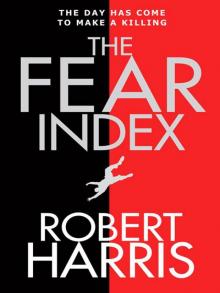 The Fear Index
The Fear Index The Second Sleep
The Second Sleep V2
V2 Lustrum c-2
Lustrum c-2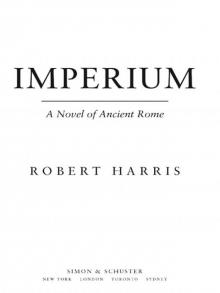 Imperium
Imperium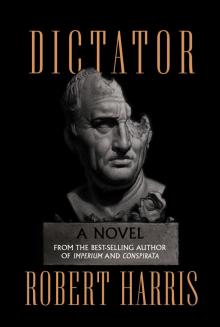 The Dictator
The Dictator Selling Hitler
Selling Hitler Archangel (Mass Market Paperback)
Archangel (Mass Market Paperback)